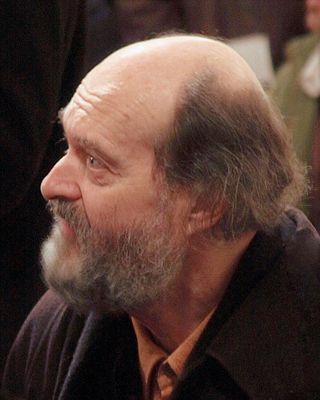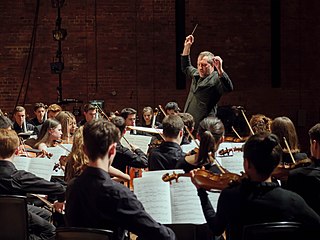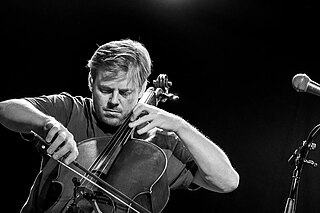Related Research Articles

Arvo Pärt is an Estonian composer of contemporary classical music. Since the late 1970s, Pärt has worked in a minimalist style that employs tintinnabuli, a compositional technique he invented. Pärt's music is in part inspired by Gregorian chant. His most performed works include Fratres (1977), Spiegel im Spiegel (1978), and Für Alina (1976). From 2011 to 2018, and again in 2022, Pärt was the most performed living composer in the world, and the second most performed in 2019, after John Williams. The Arvo Pärt Centre, in Laulasmaa, was opened to the public in 2018.

György Kurtág is a Hungarian composer of contemporary classical music and pianist. According to Grove Music Online, with a style that draws on "Bartók, Webern and, to a lesser extent, Stravinsky, his work is characterized by compression in scale and forces, and by a particular immediacy of expression". In 2023 he was described as "one of the last living links to the defining postwar composers of the European avant-garde".

Howard Harold Hanson was an American composer, conductor, educator, music theorist, and champion of American classical music. As director for 40 years of the Eastman School of Music, he built a high-quality school and provided opportunities for commissioning and performing American music. In 1944, he won a Pulitzer Prize for his Symphony No. 4, and received numerous other awards including the George Foster Peabody Award for Outstanding Entertainment in Music in 1946.

Morton Subotnick is an American composer of electronic music, best known for his 1967 composition Silver Apples of the Moon, the first electronic work commissioned by a record company, Nonesuch. He was one of the founding members of California Institute of the Arts, where he taught for many years.

Thomas Joseph Edmund Adès is a British composer, pianist and conductor. Five compositions by Adès received votes in the 2017 Classic Voice poll of the greatest works of art music since 2000: The Tempest (2004), Violin Concerto (2005), Tevot (2007), In Seven Days (2008), and Polaris (2010).
Bent Lorentzen was a Danish composer. He was one of the outstanding figures in contemporary Danish music. His works are frequently performed at festivals at home and abroad, and he had established particularly close links with musical life in Poland and Germany. He was honoured with several international prizes and was named Choral Composer of the Year in Denmark in 1989.
Mario Davidovsky was an Argentine-American composer. Born in Argentina, he emigrated in 1960 to the United States, where he lived for the remainder of his life. He is best known for his series of compositions called Synchronisms, which in live performance incorporate both acoustic instruments and electroacoustic sounds played from a tape.

Per Nørgård is a Danish composer and music theorist. Though his style has varied considerably throughout his career, his music has often included repeatedly evolving melodies—such as the infinity series—in the vein of Jean Sibelius, and a perspicuous focus on lyricism. Reflecting on this, the composer Julian Anderson described his style as "one of the most personal in contemporary music". Nørgård has received several awards, including the 2016 Ernst von Siemens Music Prize.

Simon Bainbridge was a British composer. He was also a professor and head of composition at the Royal Academy of Music, London, and visiting professor at the University of Louisville, Kentucky, in the United States.

The Elder Conservatorium of Music, also known as "The Con", is Australia's senior academy of music and is located in the centre of Adelaide, the capital of South Australia. It is named in honour of its benefactor, Sir Thomas Elder (1818–1897). Dating in its earliest form from 1883, it has a history in professional training for musical performance, musical composition, research in all fields of music, and music education. The Elder Conservatorium of Music and its forerunners have been parts of the University of Adelaide since the early 1880s. The current Director is Professor Anna Goldsworthy.
Fergus Johnston is an Irish composer and member of Aosdána.
Søren Nils Eichberg is a German/Danish classical composer and conductor.

Jakob Kullberg is a classical cellist, noted for his collaboration with the Danish composer Per Nørgård.
Peter Askim is an American composer of modern classical music, conductor, music educator and a double bassist.
Morten Olsen is a Danish composer.
Friedhelm Döhl was a German composer and professor of music.
Roger Briggs is an American composer, conductor, pianist, and educator.
Simon Steen-Andersen is a Danish composer, performer, director and media artist.
Louis Franz Aguirre is a Cuban composer and conductor that has achieved international recognition.
Hugi Guðmundsson is an Icelandic composer of contemporary classical music. His work is performed internationally at concerts and music festivals. He lives and works as a composer in Copenhagen, Denmark.
References
- ↑ Christensen, Jean; White, John; Herresthal, Harald; Broman, Per F.; Pedersen, Morten Eide; Korhonen, Kimmo (2002). New Music of the Nordic Countries. Pendragon Press. p. 85. ISBN 978-1-57647-019-0.
- ↑ Montague, Gary (12 February 1992). Live Electronics. Vol. 6. CRC Press. p. 207. ISBN 978-3-7186-5116-0.